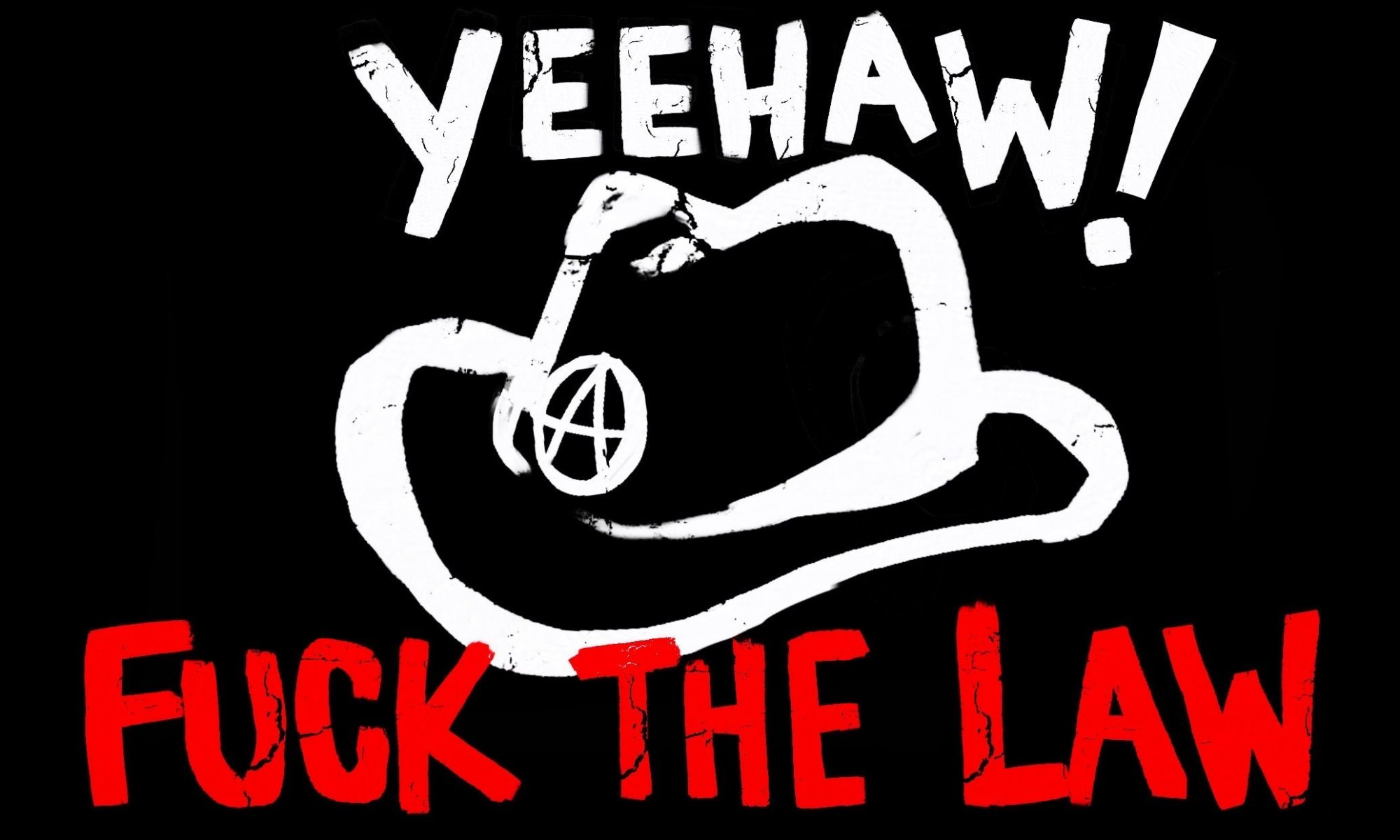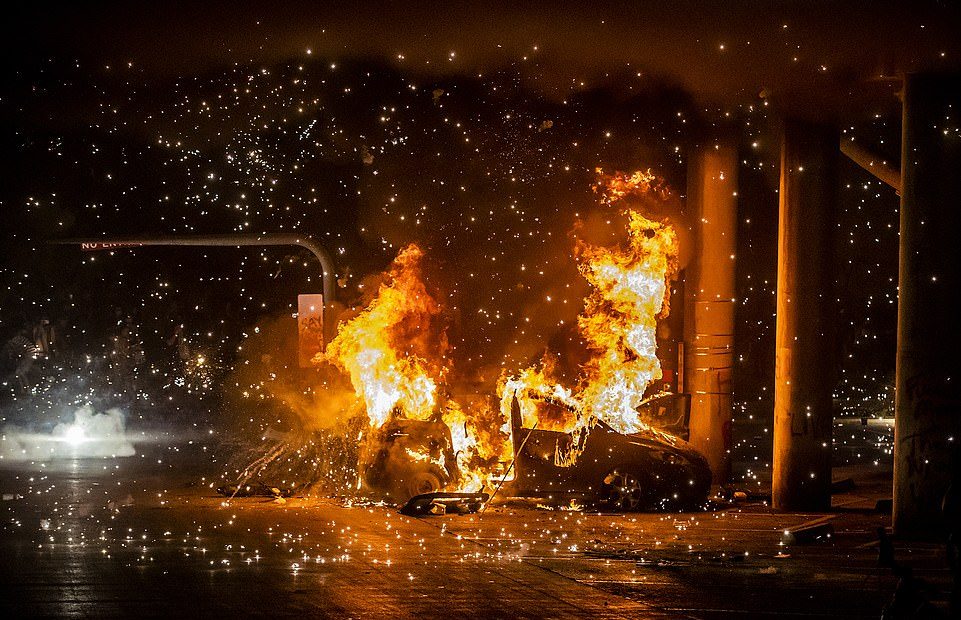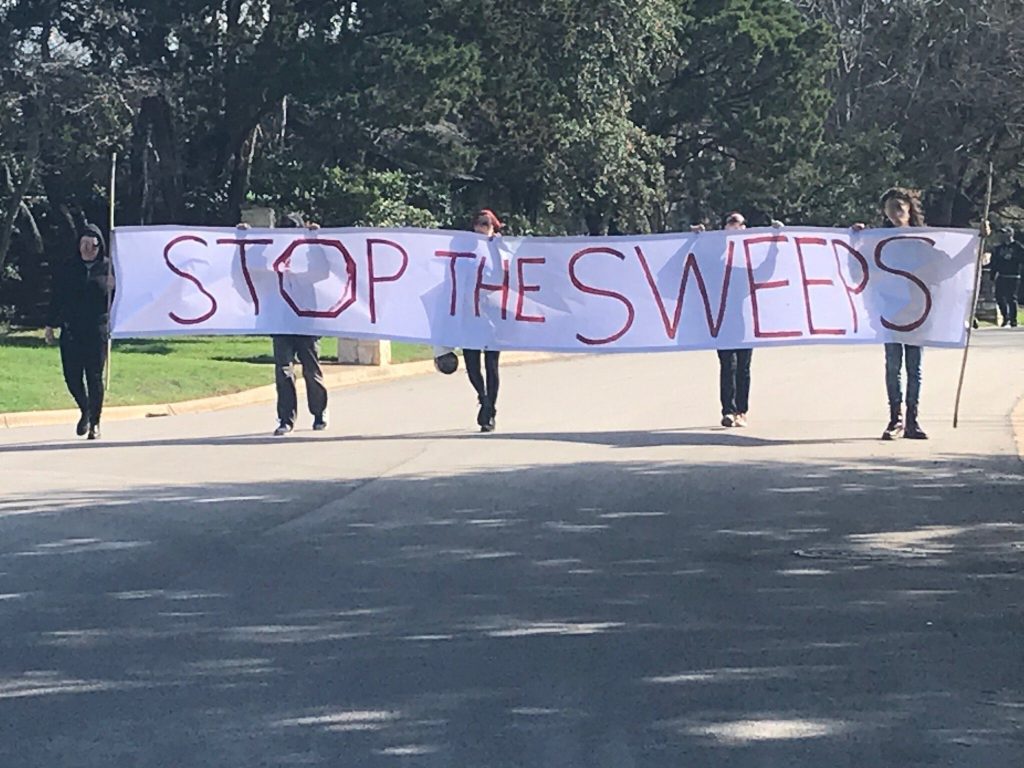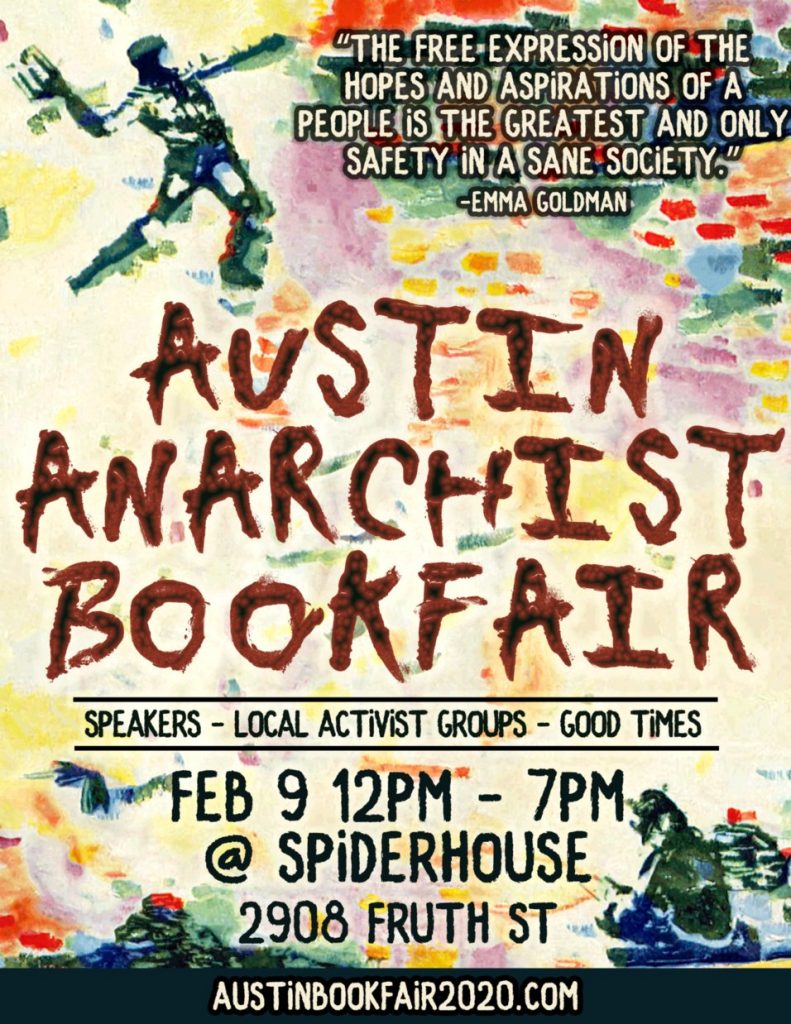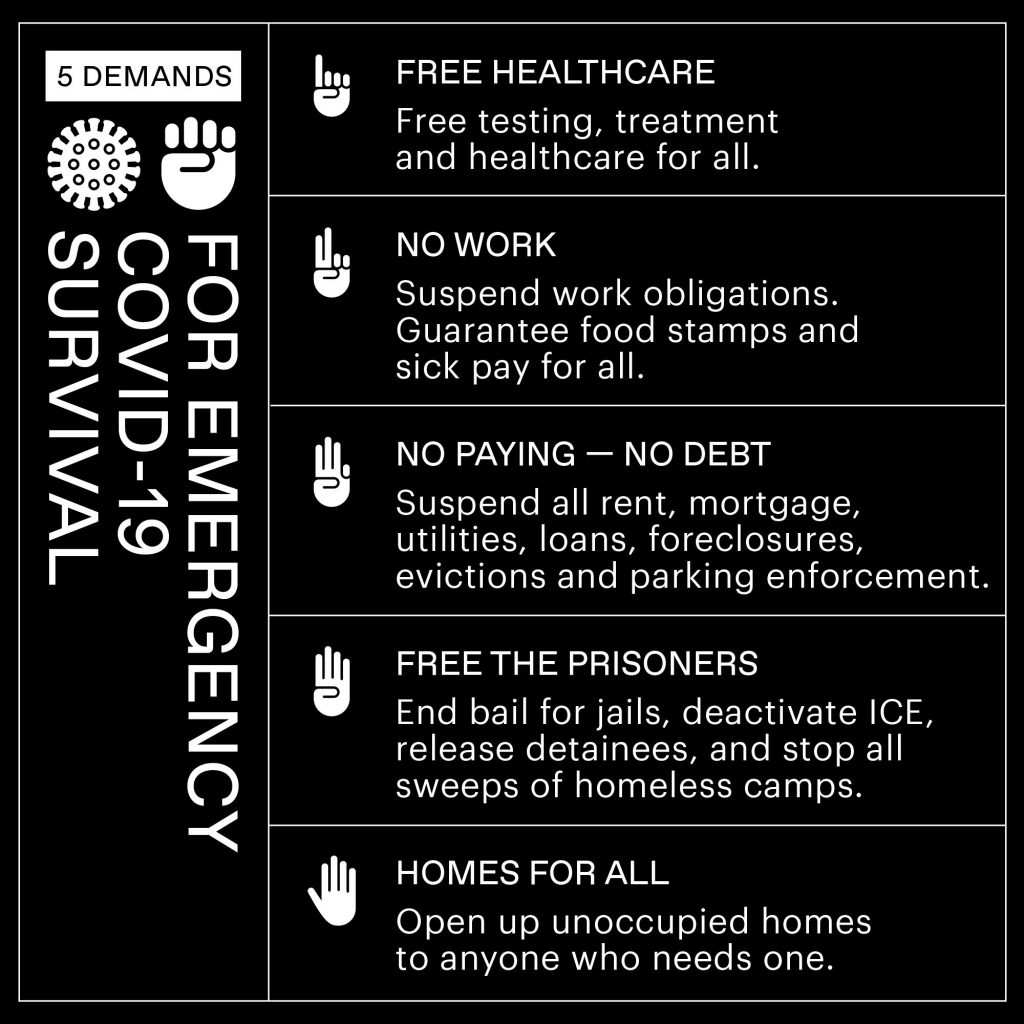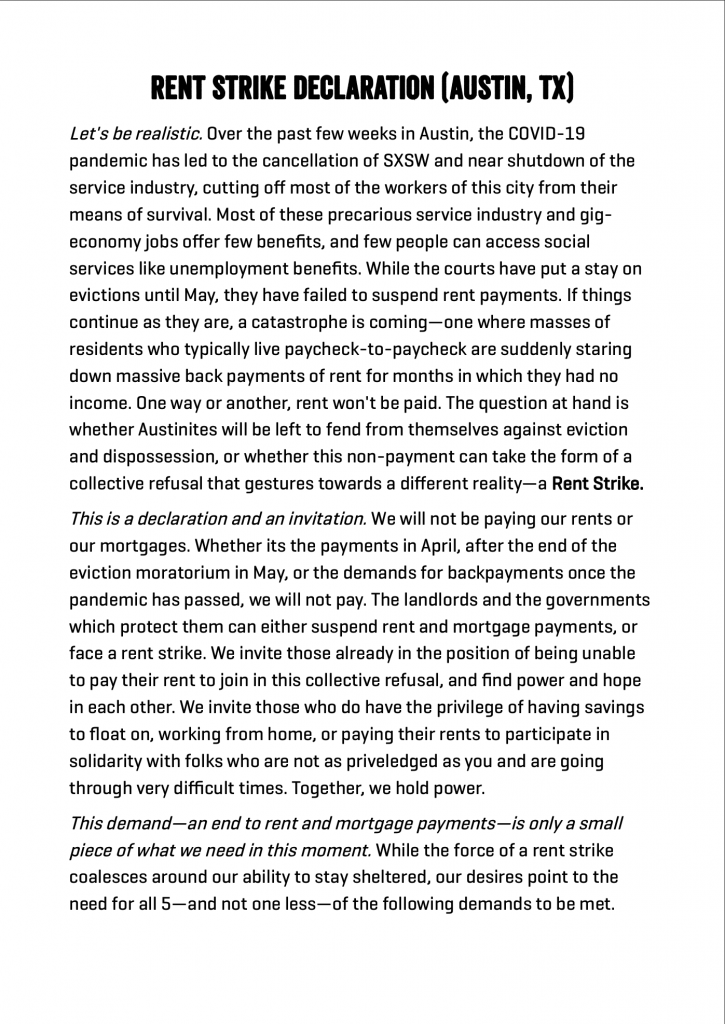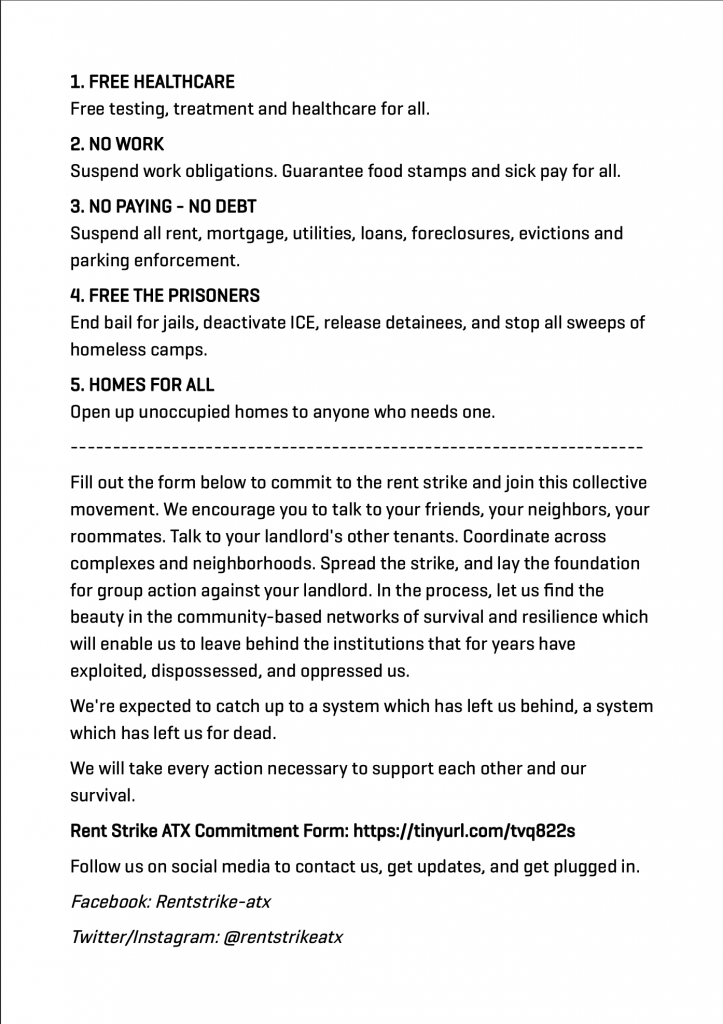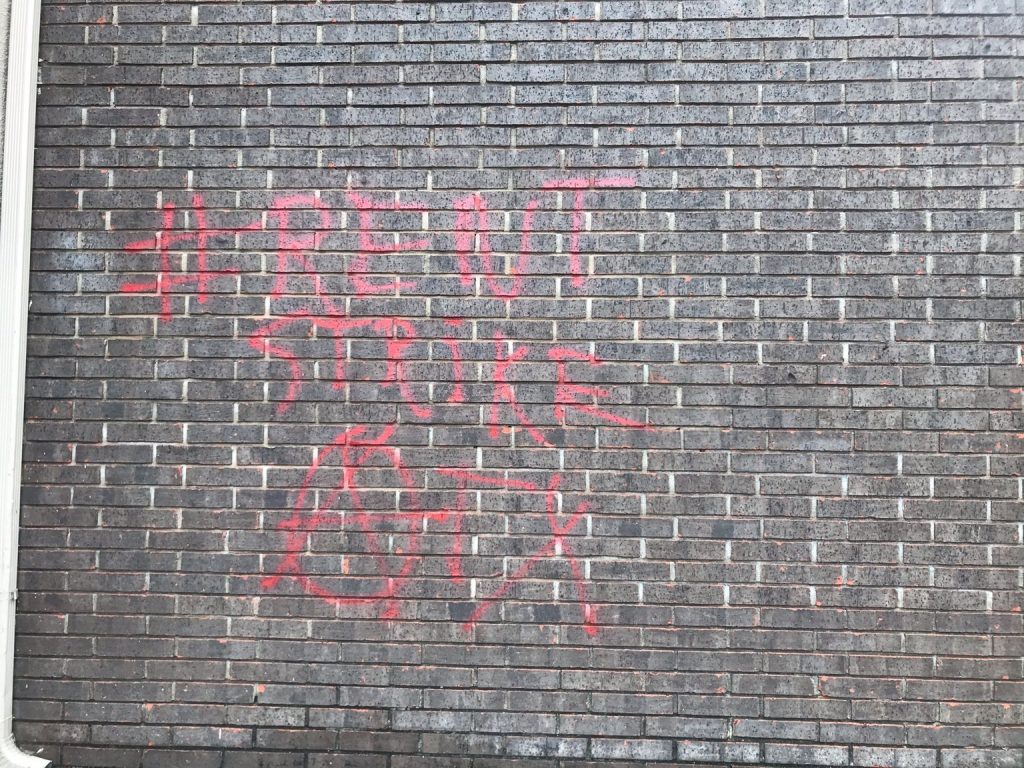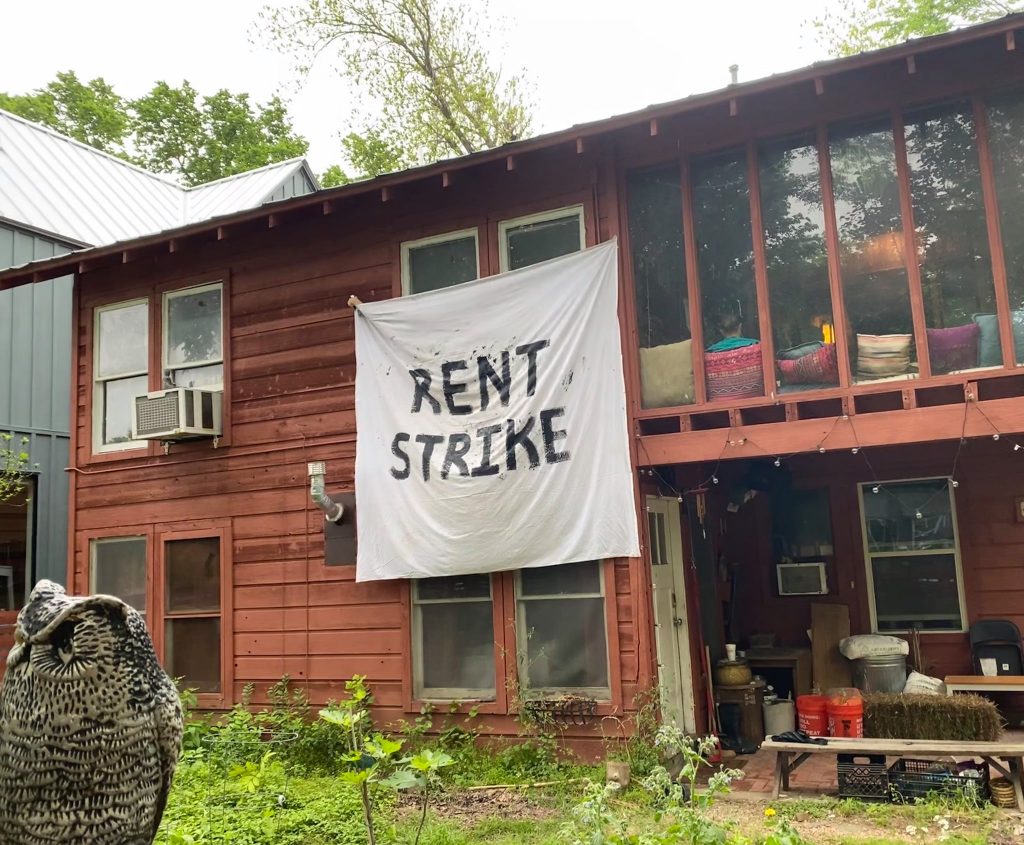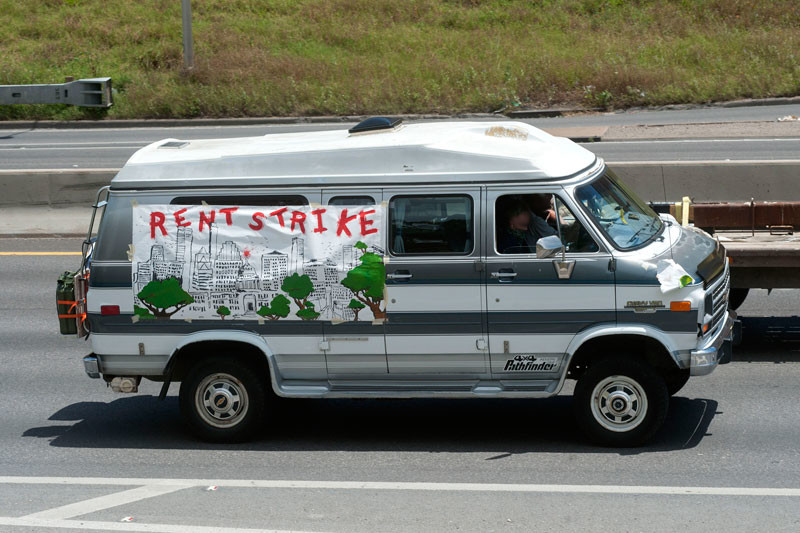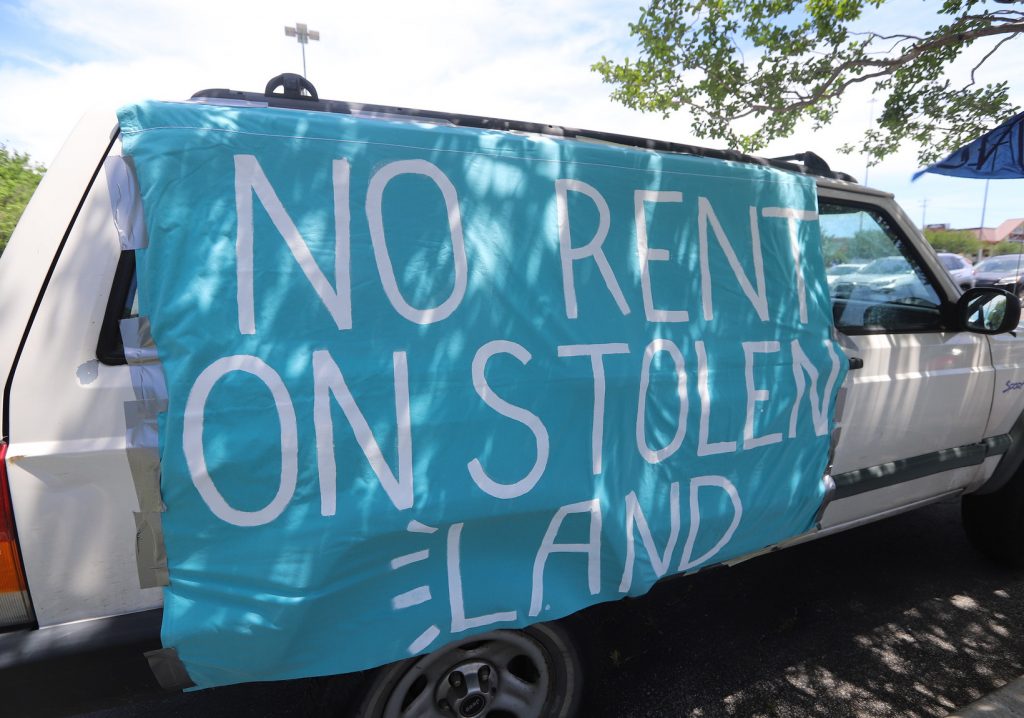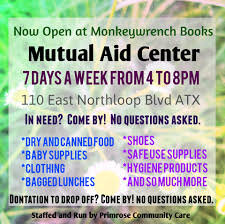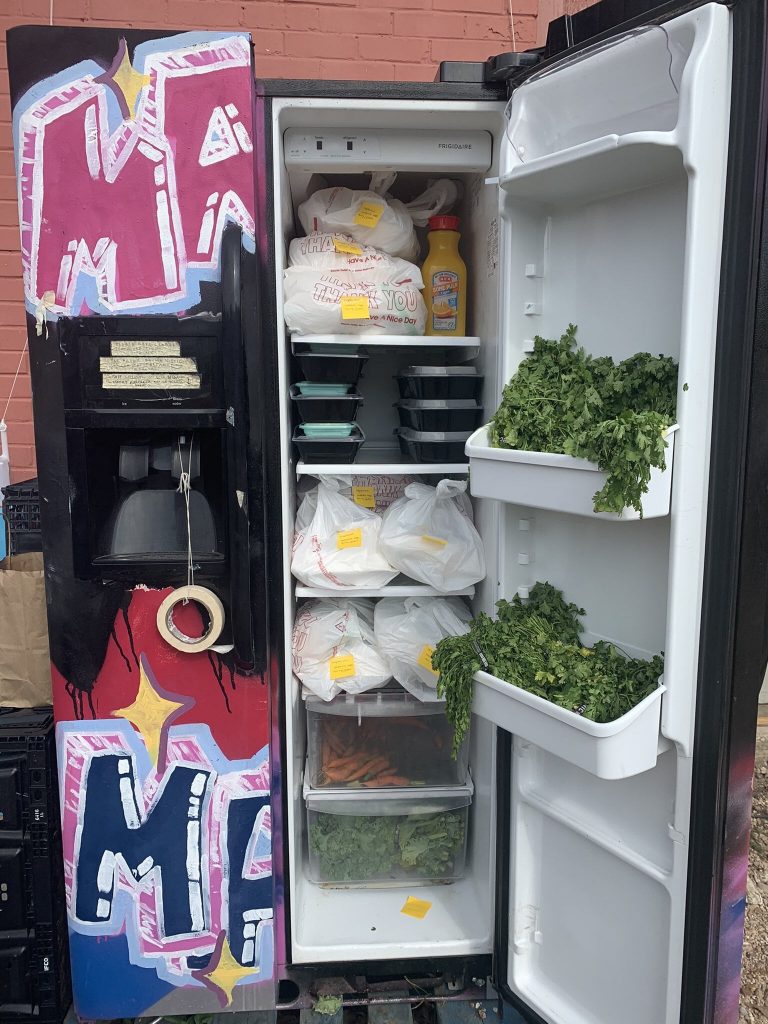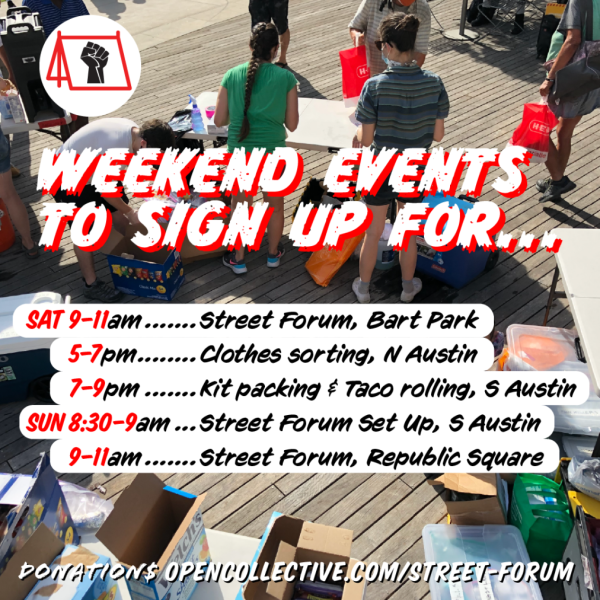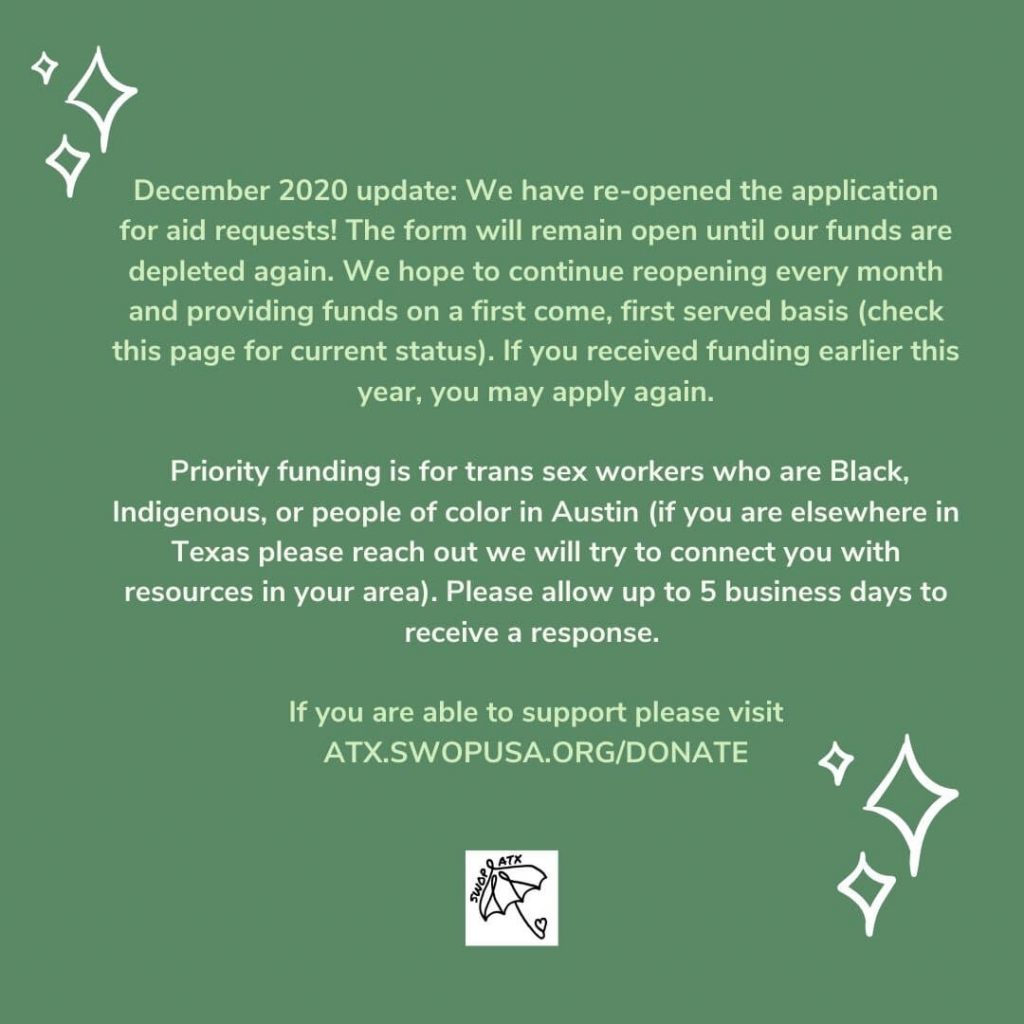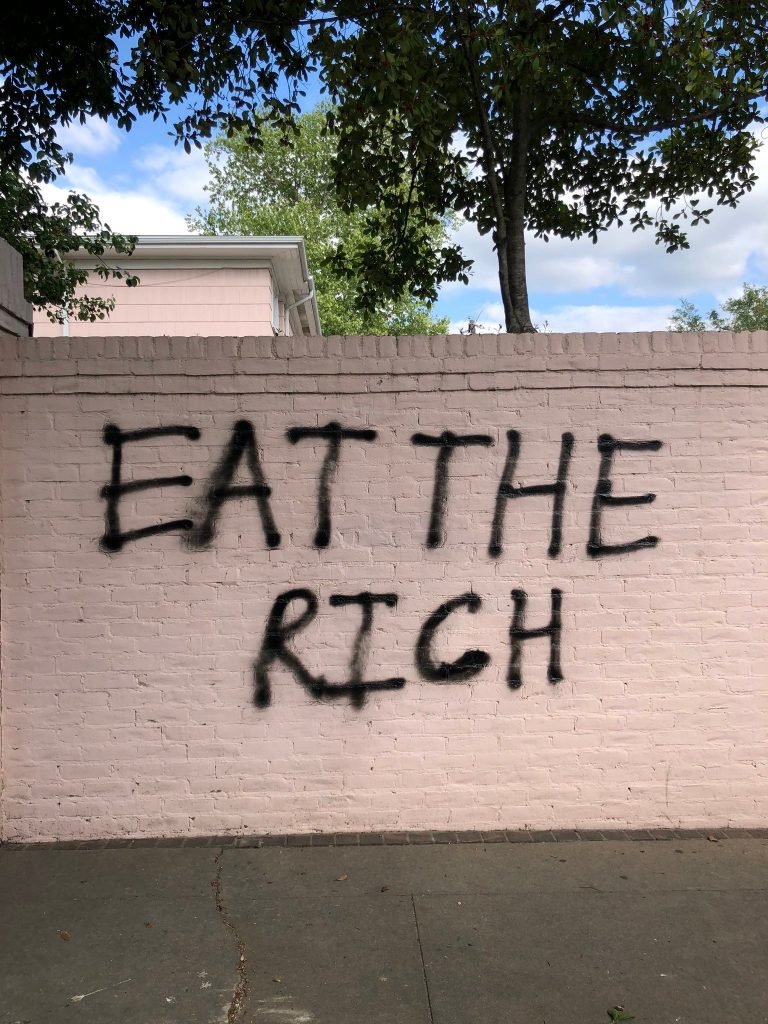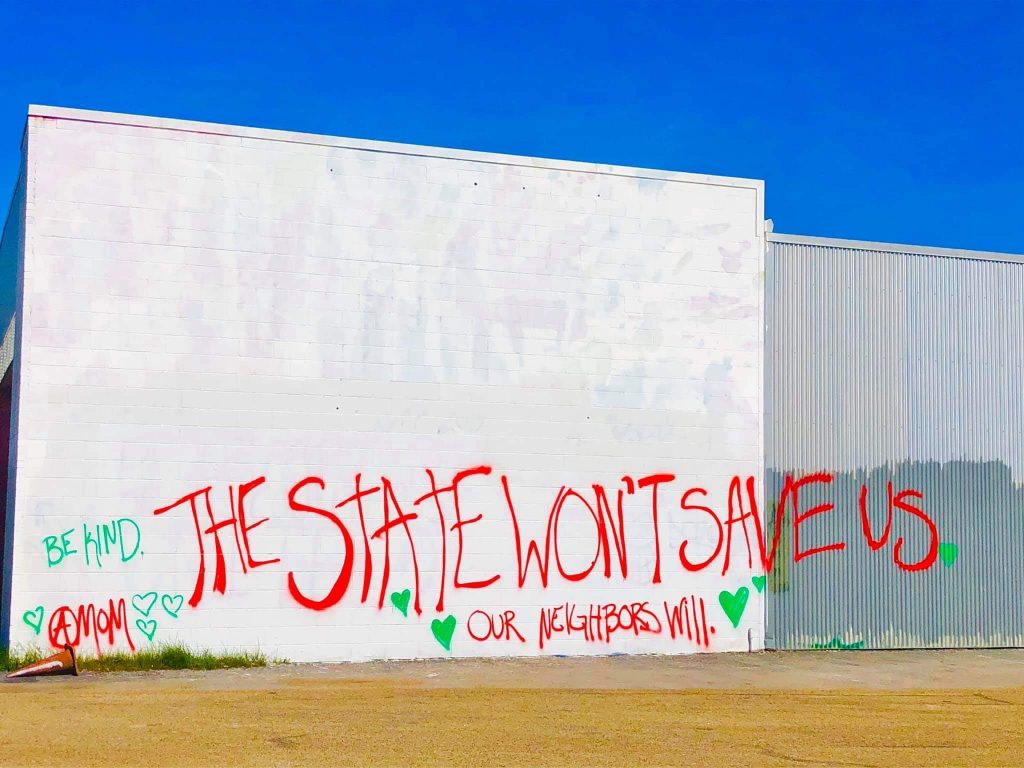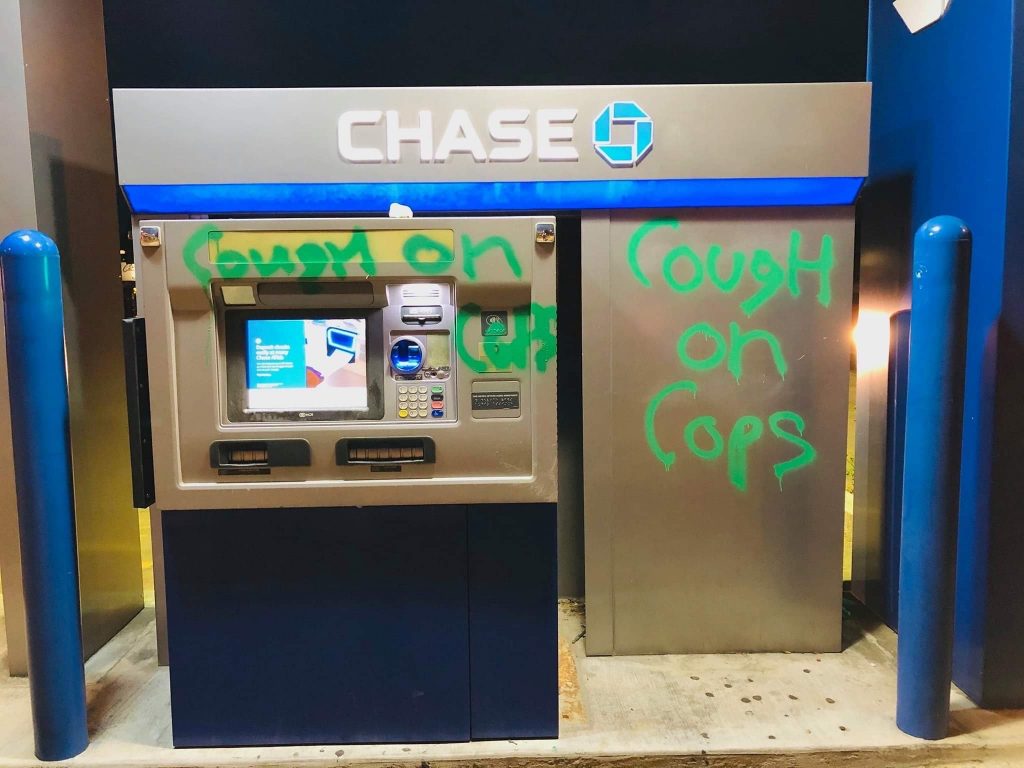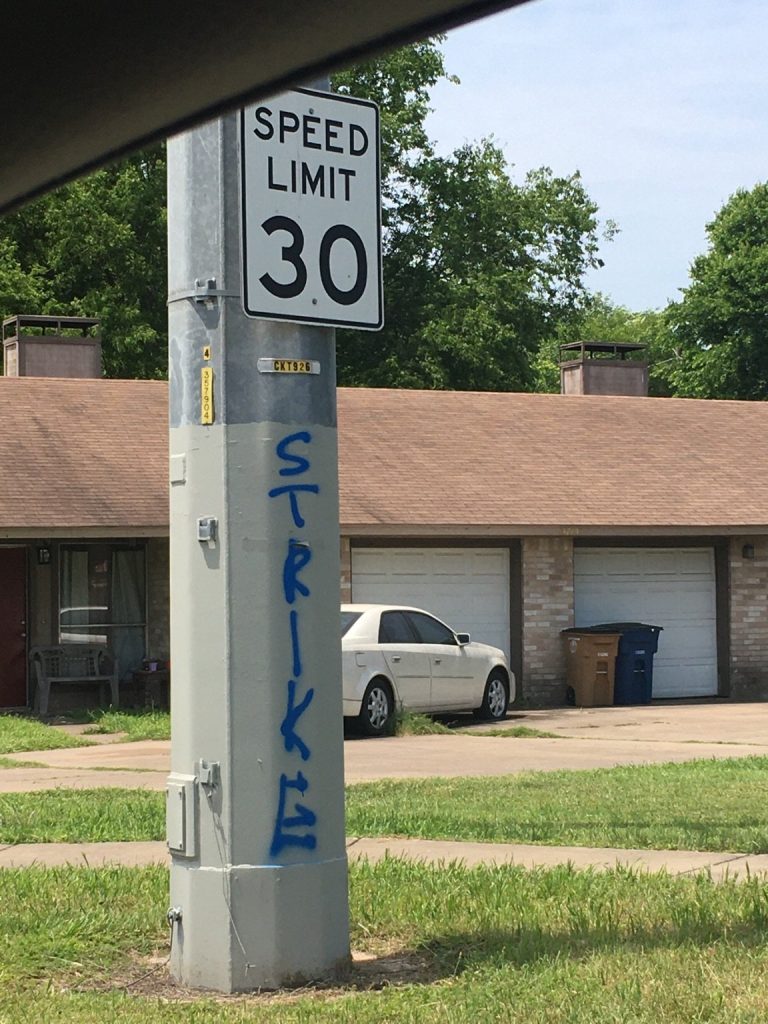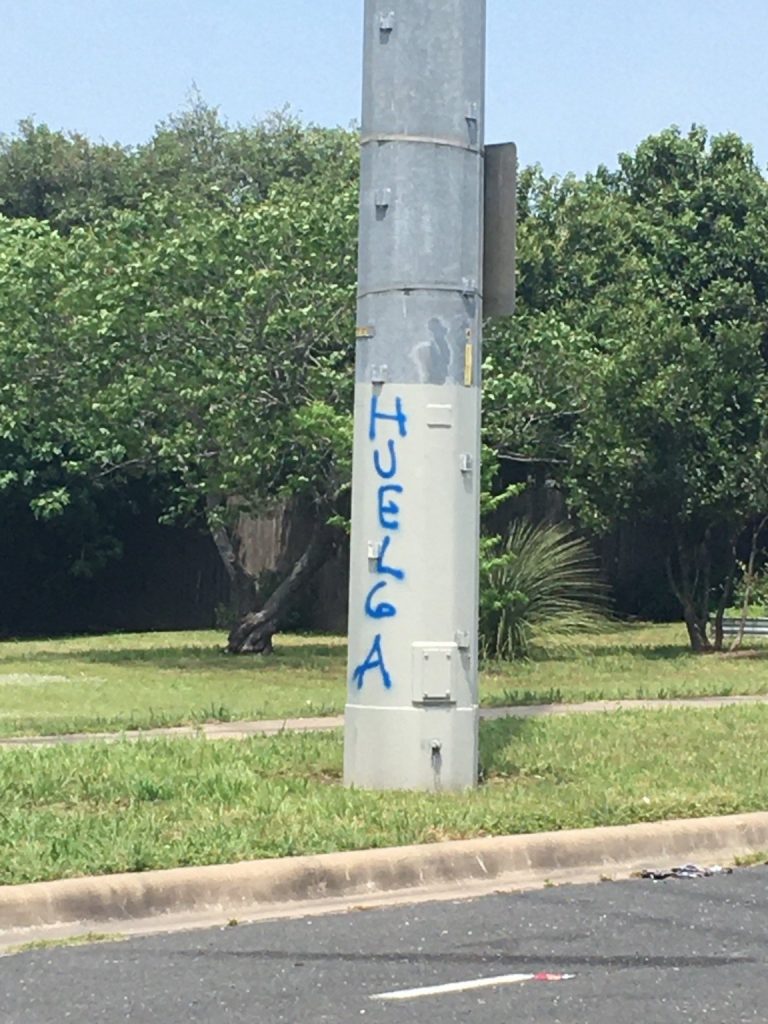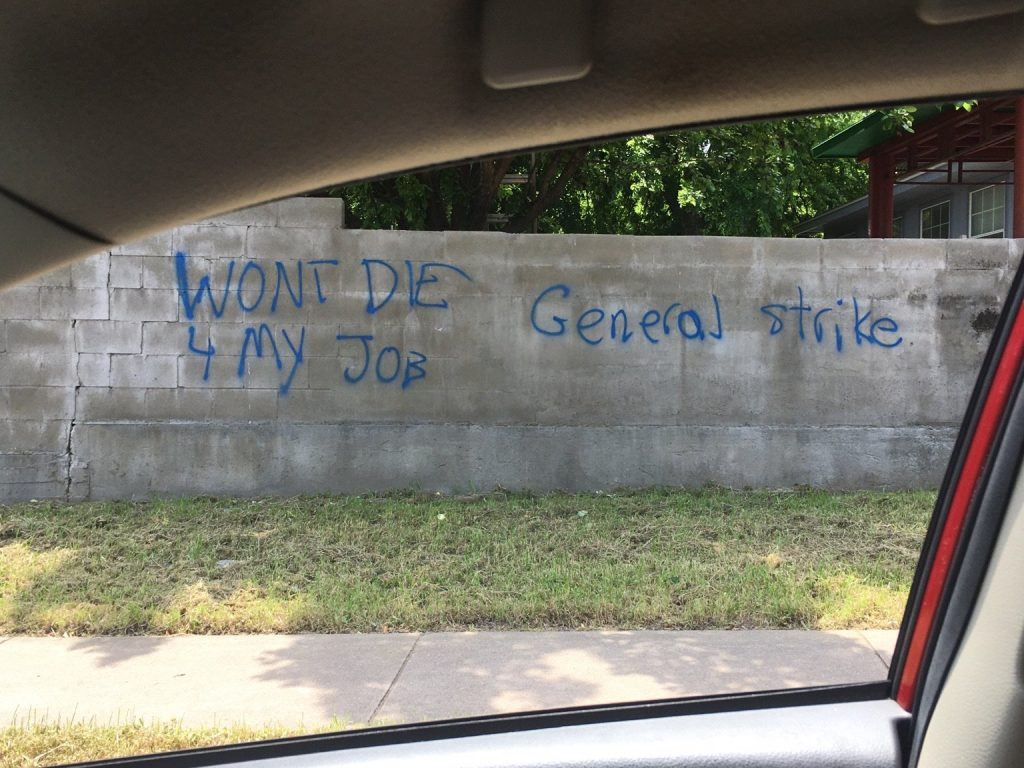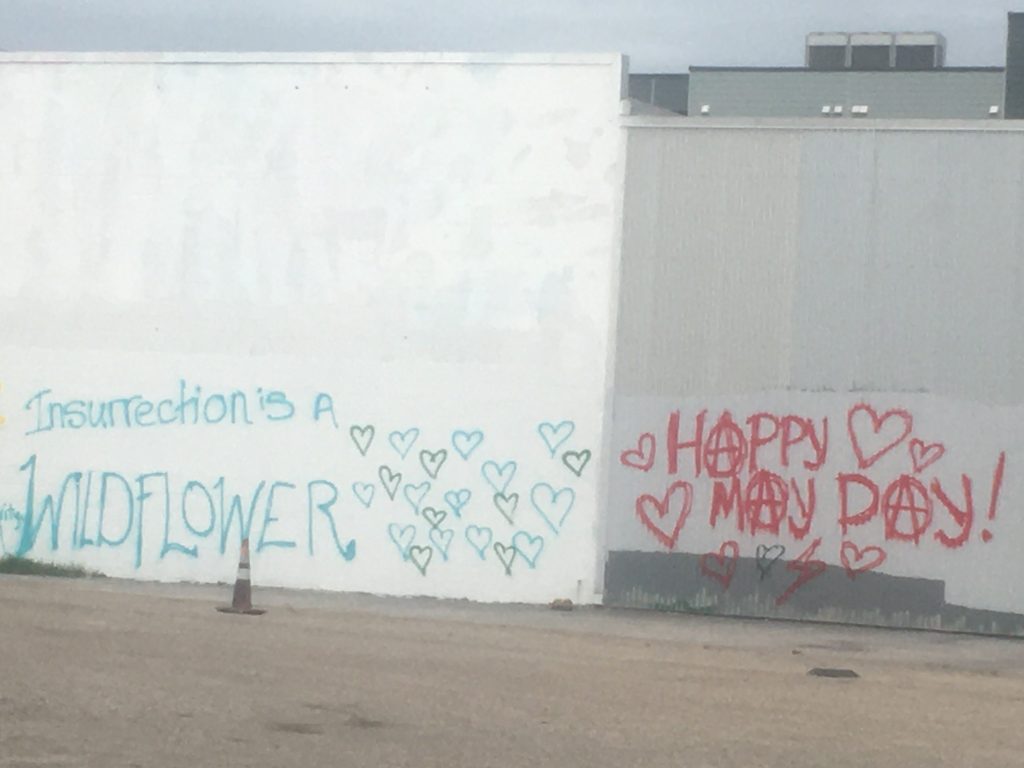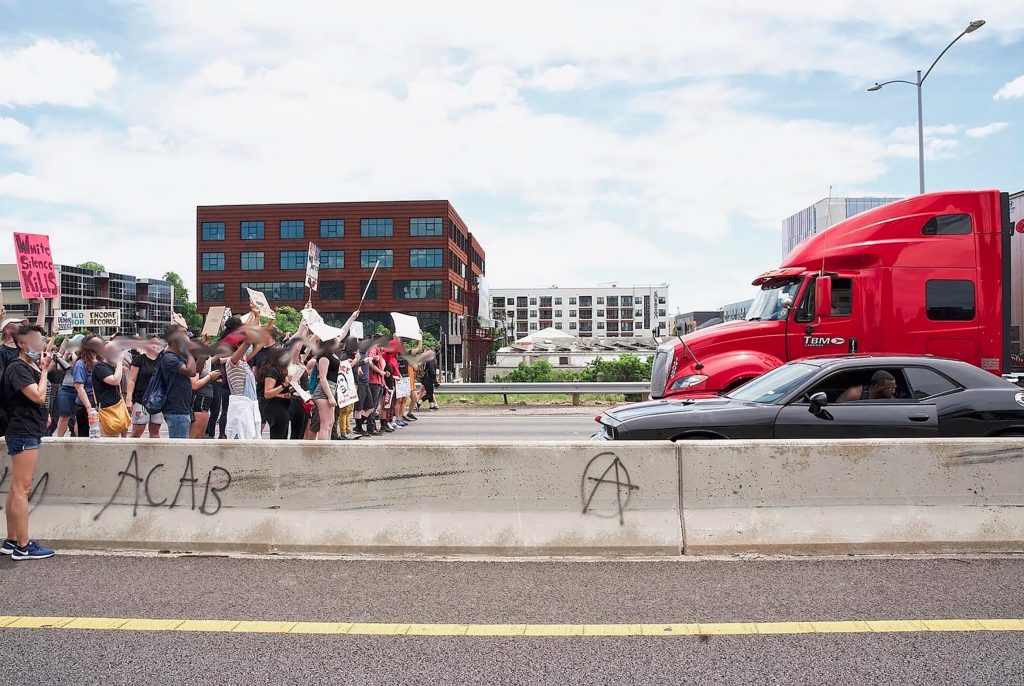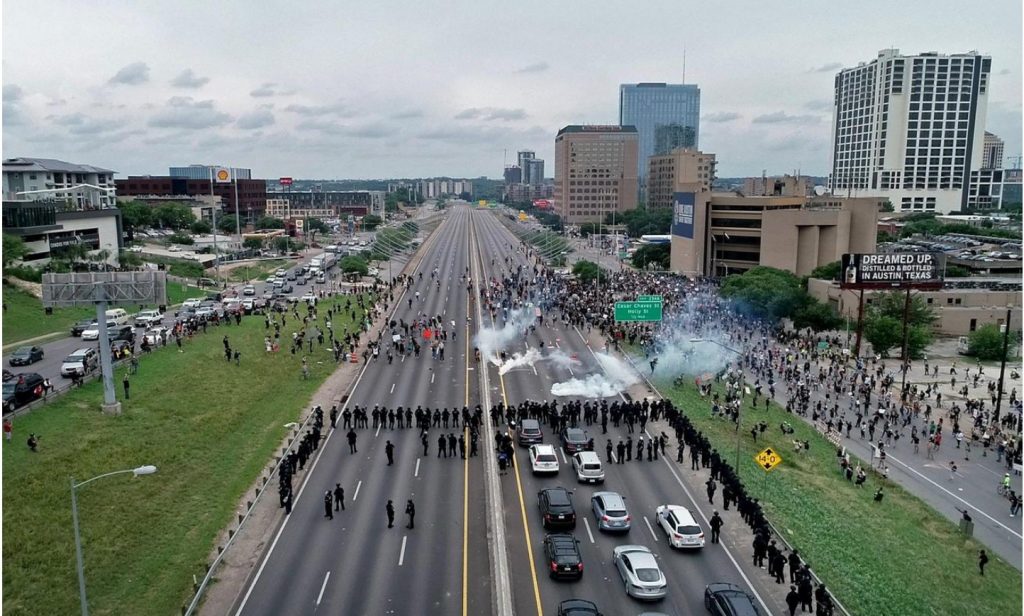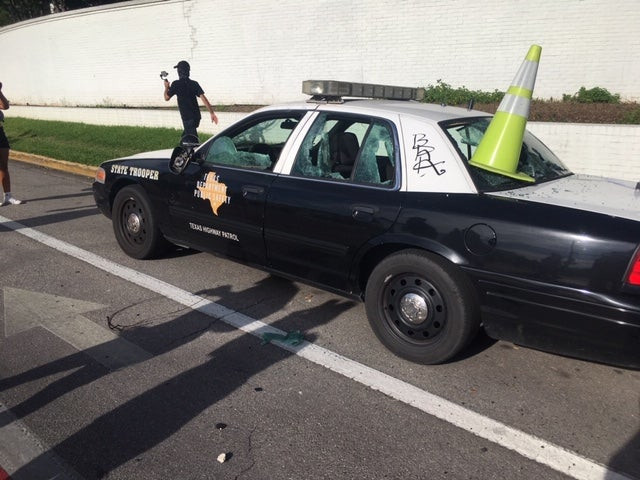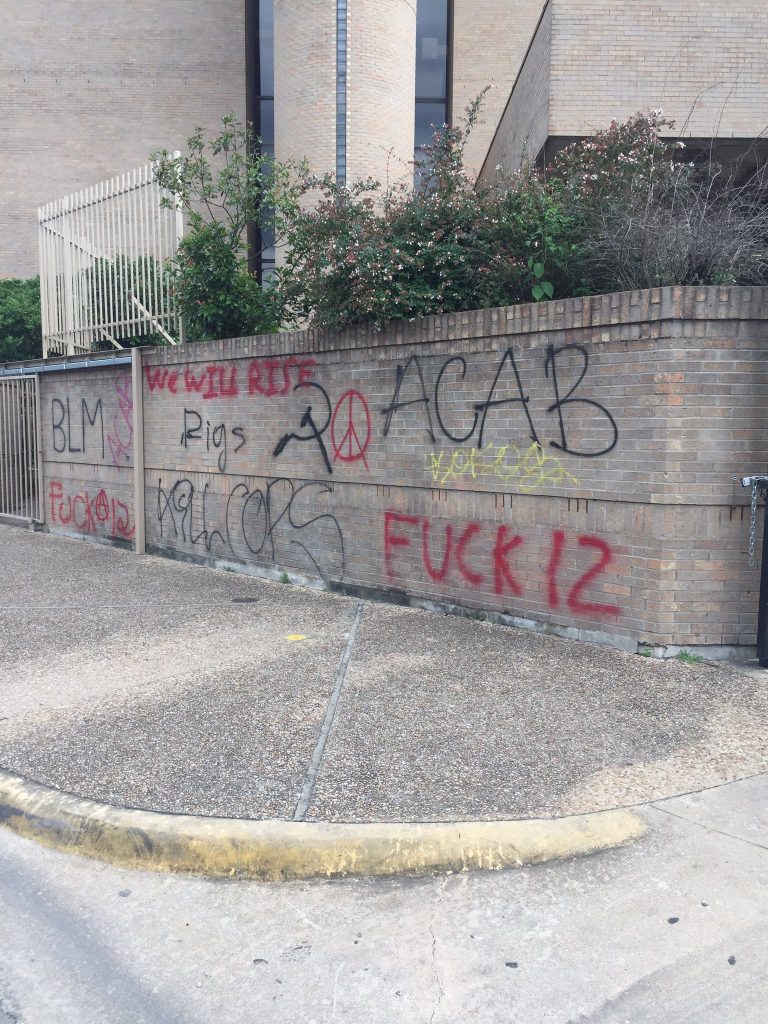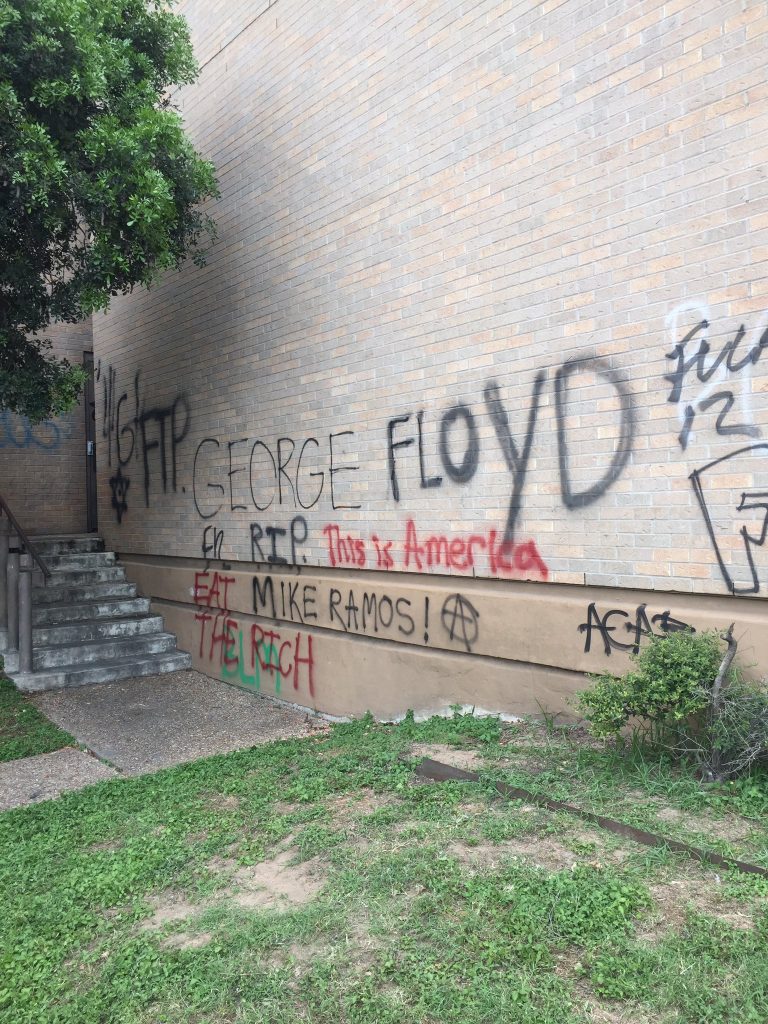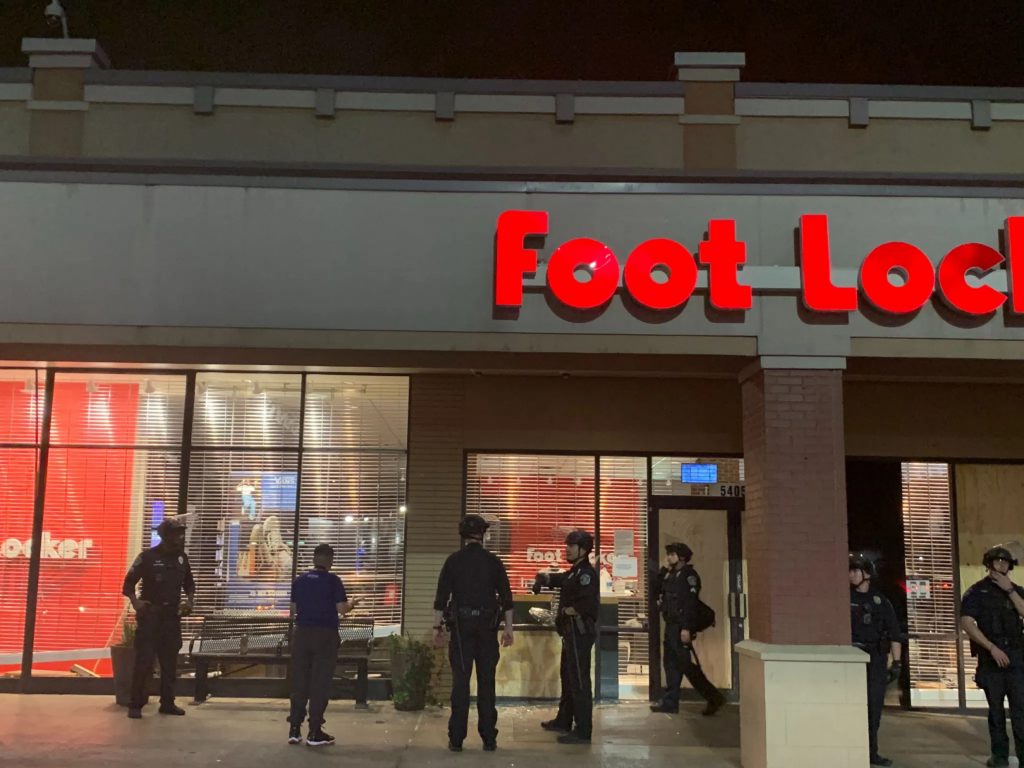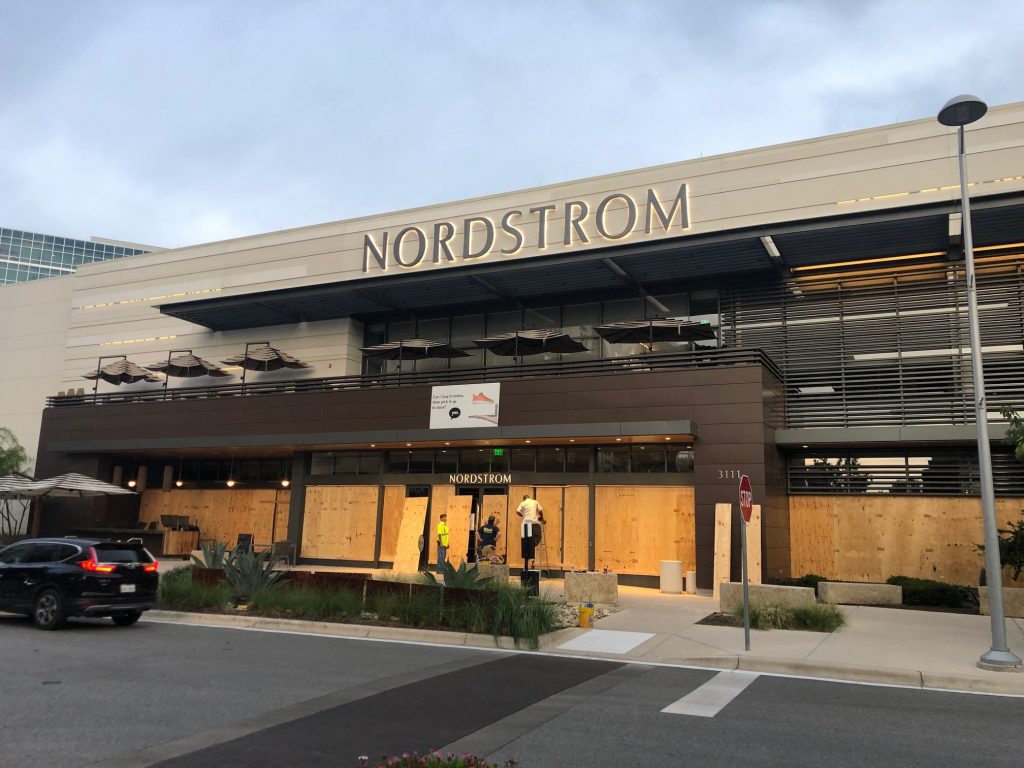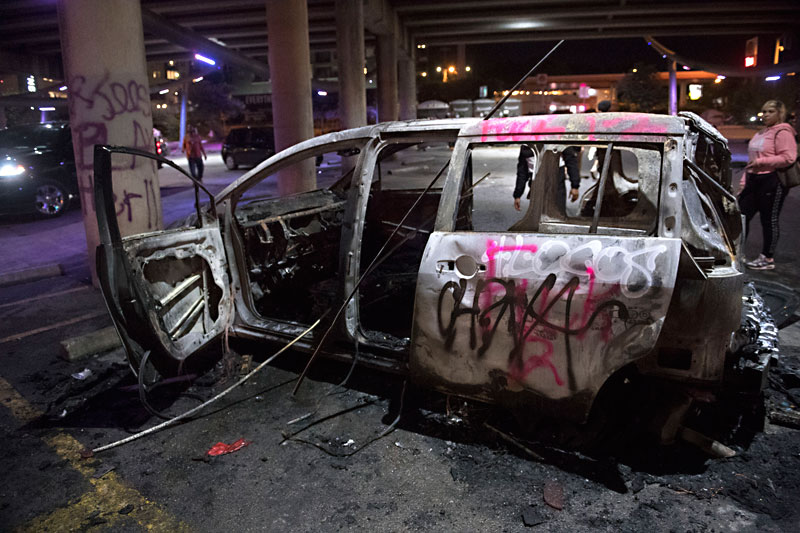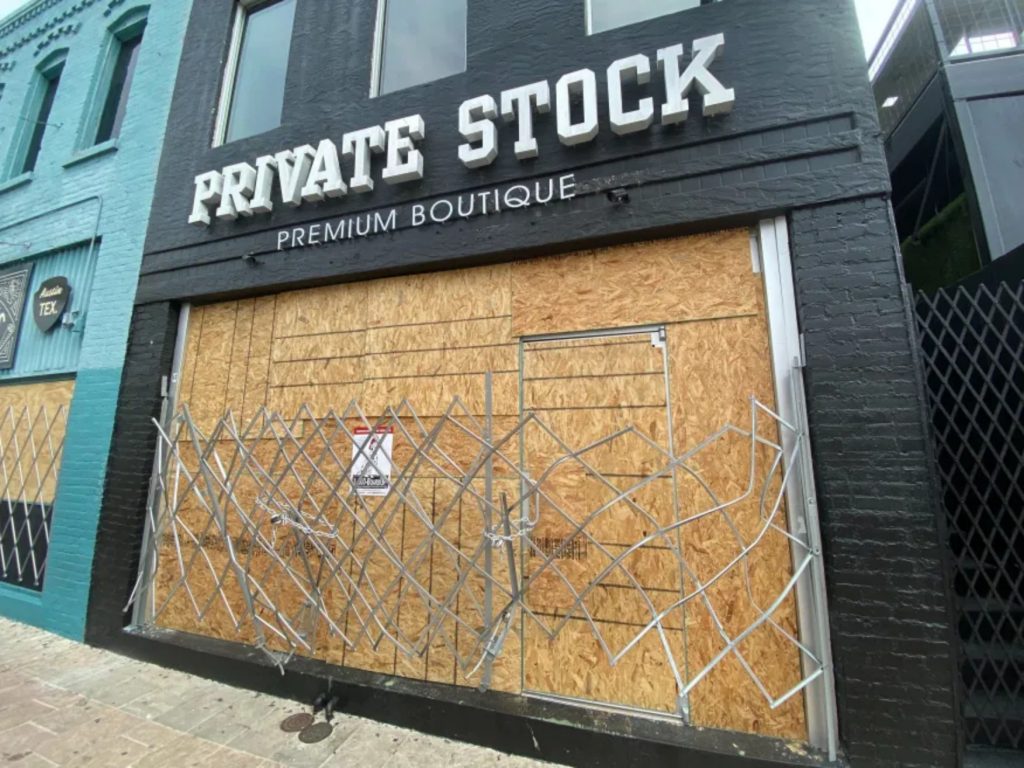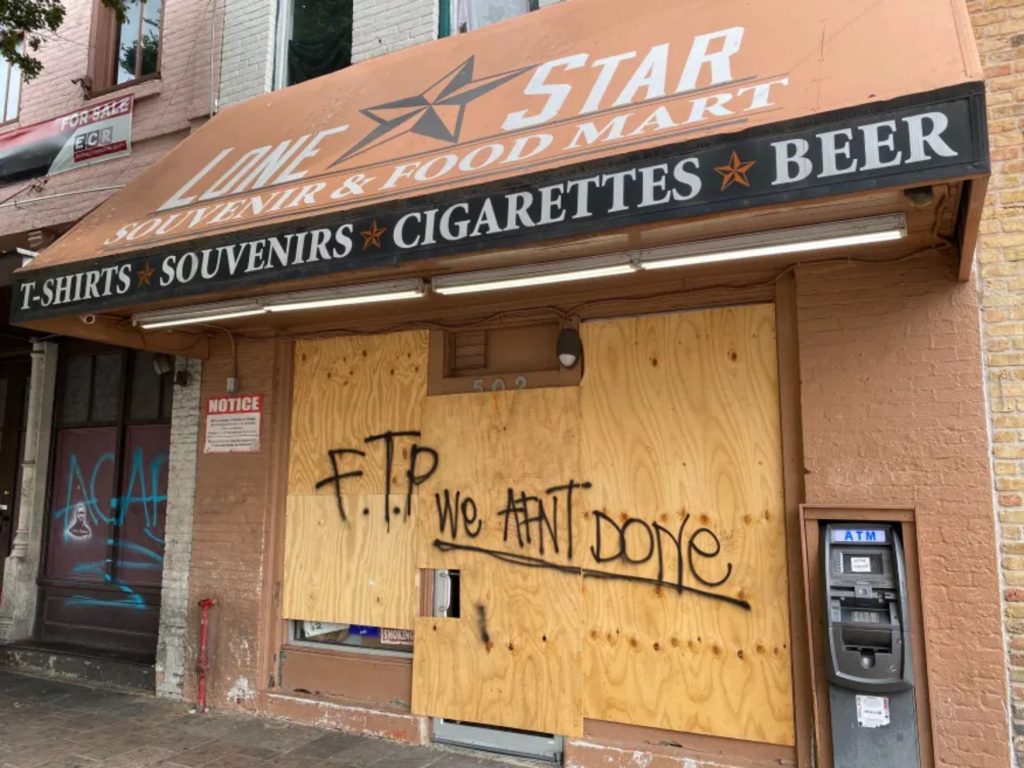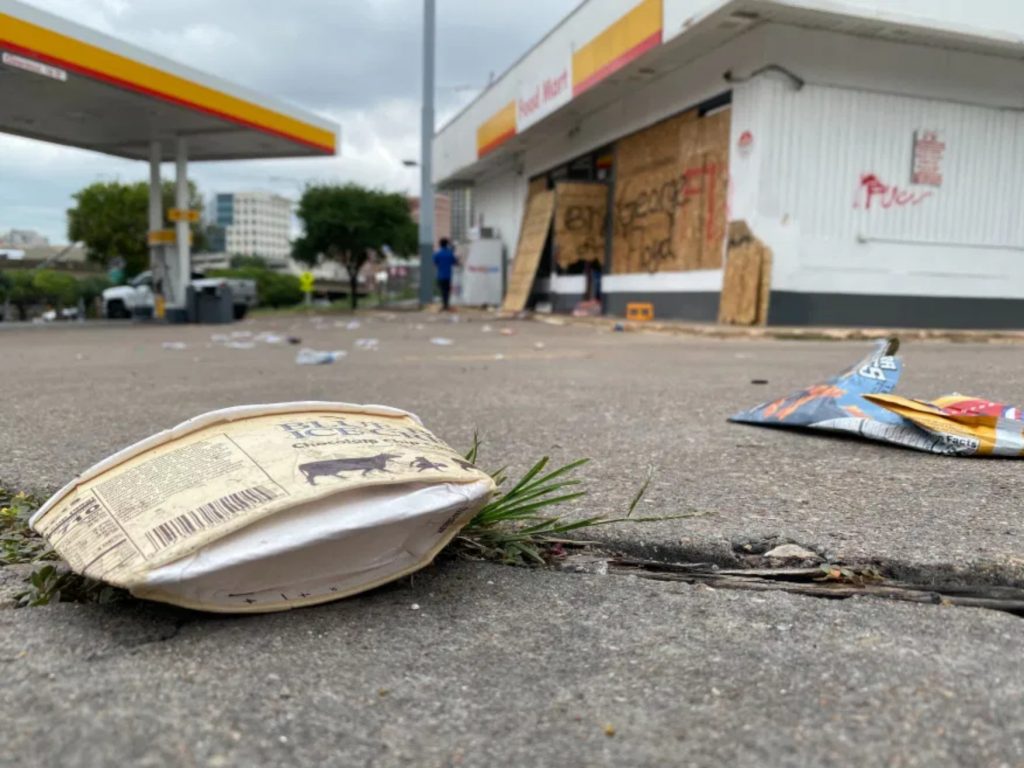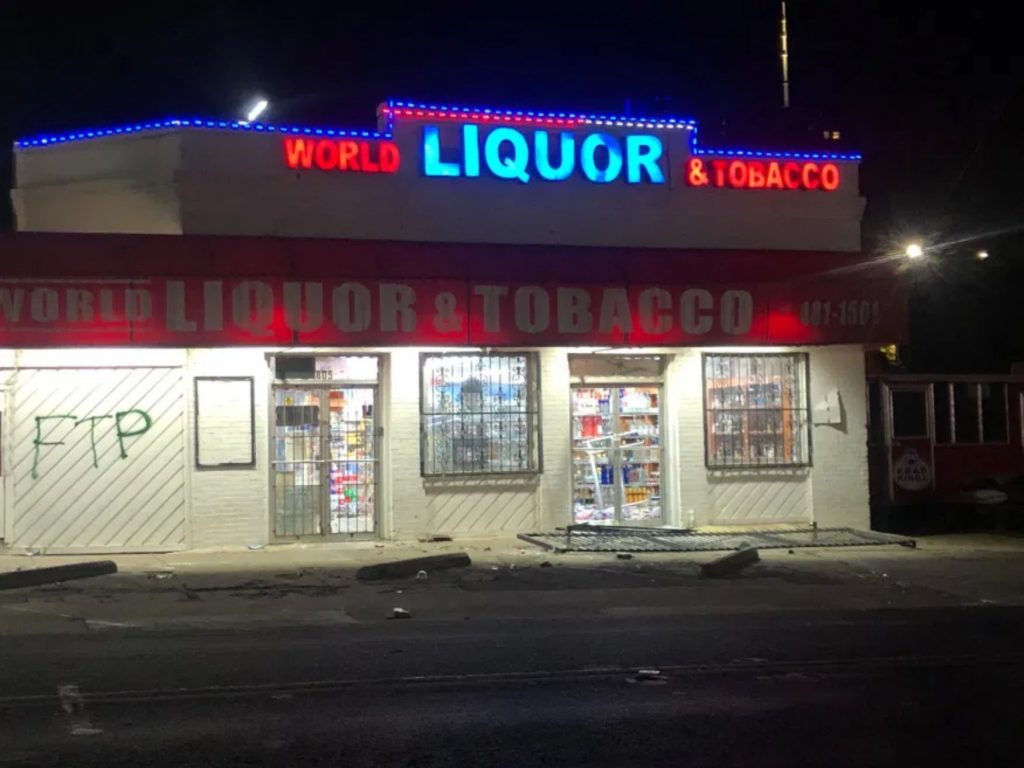Austin Autonomedia: Keep Austin Criminal
2020 was a year of insurgent milestones in Austin–an explosion of autonomous initiatives, a proliferation of insurrectionary tactics and revolt, and the weaving together of new connections between fragmented worlds inhabiting this territory.
We’ve decided to forefront some of the highlights of this year, to celebrate the high points of this year and look forward to the next one. This is not a claim to a comprehensive review of the activity of this past year, an attempt at in-depth analysis and critique, nor a claim to what projects/initiatives/actions “mattered” or not–it’s merely a reflection of things that we have found on our radar, find inspiring, and wish to highlight and remember. We encourage any fellow insurgents reading this to put out their own analysis and perspectives about the event of this year, whether through our page, your own platforms, or wheatpasted on the walls of the city.
Growing Austin Scenes
The year started out slow yet generative, with small gestures pointing to the growth of autonomous initiatives and networks in the city.
January
Austin Anarchist Black Cross hosted a workshop on police abolition
Stop the Sweeps led a protest at the home of Fred Weber Jr., CEO of WorkQuest, calling for the company to stop facilitating contracts for the sweeps. WorkQuest would later back out of the sweeps contract in April, passing it on to its subcontracter Relief Enterprise.
February
Stop the Sweeps released a statement of principles and a zine about their perspectives on the fight against the sweeps.
third place atx, a local autonomy-focused, qtbipoc centered DIY space resumed hosting events. Notably, they hosted an event called Green House. From their description:
The architecture of our society is characterized by competition, resource degradation, and systemic injustice. We seek to join our neighbors in grappling with and, ultimately, dismantling that rule by creating what Naomi Klein calls an “infrastructure of care”—in this case, a designated space for discussing our relationship with the earth and each other. At each meeting, we will engage all senses in order to root ourselves in the present: we will eat, drink, and cook; view and participate in art; listen to music; sing; sit in contemplation; shake hands; touch earth; and, importantly, provide opportunities to create. We hope to help each other deal with the complicated anger, grief, and hope endemic to our time.
An Austin Anarchist Bookfair brought together numerous crews and offered new space for connection and entry into local scenes.`The bookfair featured tables from projects across Texas, performances by local bands, and workshops on things like copwatching and harm reduction.
March
third place atx hosted a Stop the Sweeps film screening, which screened the documentary “Takeover,” about a series of nationwide housing takeovers by homeless activists in the 1990s.
Transition into COVID-19
The lockdown at the beginning of the pandemic, and the associated collapse in social services and income for many people, was met with an explosion of groups organizing around meetings people’s basic needs. Mutual aid became a more generalized activity, and some organizations started to push for other demands—using the “5 demands” as a template—related to rents, incarceration, sweeps, and more.
The 5 Demands
Stop the Sweeps kept up a continuous fight against the sweeps throughout the pandemic and the subsequent uprising. They released a statement in response to the initial onset of COVID-19, and put on pressure to get the city to temporarily pause the sweeps. Members of Stop the Sweeps and Rent Strike ATX got involved in helping unhoused people navigate the city’s lackluster services for those facing risks from COVID, and made efforts to push for more resources and response. On April 9th, Stop the Sweeps hosted the first of 3 slow-roll car demos in downtown Austin, targeting Mayor Adler’s residence at the W. While their demands focused largely on opening up hotels and access to care & testing for homeless people, they also highlighted other demands such as rent suspension and freedom for prisoners.
Rent Strike ATX put out a declaration calling for tenant organizing and rent strikes, joining the international wave of rent strikes that proliferated during the pandemic. The main face of the rent strike in Austin was Concordia Co-op, which after 2 months on strike reached a negotiated agreement with their landlord for a rent reduction, generous payment plan, and a guaranteed 5-year, rent-frozen lease. The movement reached a climax with a May Day car demonstration which shut down I-35. As of the summer, Rent Strike had rebranded as BATS (Building Autonomous Tenant Solidarity), and has largely remained quiet on social media.
Austin Anarchist Black Cross made a zine for distribution to prisoners and their loved ones with information on the pandemic and ways people can advocate for themselves on the inside.
Mutual Aid
ACTIVE
- ATX CAMP SUPPORT
A loose and diverse coalition of individuals and groups, including projects like Food Not Bombs and Austin Mutual Aid, which has been cooking and delivering food to homeless camps throughout Austin since the start of the pandemic. Their efforts have also expanded to providing water and keeping people cool during the hot summer, sourcing tents and other items, and providing blankets and coats for the winter months.
- MONKEYWRENCH BOOKS (@MonkeyWrenchATX)
Monkeywrench ceased normal operations during the early months of the pandemic to convert their storefront into an on-call organizing space and distribution/supply center for food and other emergency supplies. Run by a collective of volunteers, Monkeywrench is one of Austin’s major hubs for radical activity, discussion, and art, stocking myriad anarchist books and zines, and hosting reading groups several nights a week. Well-known even outside leftist circles, Monkeywrench ensured that anyone who wanted to contribute time or resources to the community could easily plug in. They have since resumed normal operations, such as a weekly Sunday tent sale, but continue to host Primrose Community Care’s free store.
- PRIMROSE COMMUNITY CARE (@PrimroseCareATX)
Formed in direct response to COVID-19, Primrose Community Care has been circulating material and informational resources consistently since March 2020. Those who found their way to Primrose’s up-to-date pandemic safety guide online would find instructions to sign up to receive weekly hot meals, personal deliveries of health and harm reduction needs, and assistance with laundry and child care. In addition to distributing bagged lunches and bulk supplies, Primrose uses social media to source specific items requested by community members in particular need. Their free store, stocked with food, clothing, and more, is open to the public at Monkeywrench Books weekdays from 4-8pm.
- ATX FREE FRIDGES (@atxfreefridge)
https://linktr.ee/atxfreefridge
This summer, a running refrigerator appeared outside Nixta Taqueria on 12th street in East Austin. Without anyone present to take charge of it, a sign invited passersby to treat it as their own fridge, to fill it with what they could and take from it what they needed. The fridge continues to draw ample donations of both packaged and prepared foods, and volunteers have since set up a second one at Unit C gallery on 2nd st. Featuring paintings from local artists, these experiments demolish the myth that we need cold bureaucracy to guide us in meeting our communities’ needs.
- STREET FORUM (@Street-Forum)
Just over a year old, Street Forum is a horizontally-run collective that holds events every weekend from 9-11am at Bartholomew Park (Saturday) and Republic Square (Sunday), geared toward providing material support to houseless community members in Austin. Prepping tacos, fresh coffee, and a growing library of reading material, they foster a relaxed, social environment, strictly free of both police and policing, and conducive to conversations and connections with our neighbors. They are currently seeking donations of warm clothing in particular, which can be dropped off at either of their usual weekend events.
- SWOP (@swopatx)
Austin’s long-running chapter of the Sex Workers Outreach Project, known for its fundraising events and monthly networking meetups for sex workers, rose to the occasion to aid sex workers whose income streams vanished under the pandemic. Pooling donations – including from an ongoing gofundme campaign, SWOP invited sex workers to apply online for assistance with funds and groceries. Prioritizing requests from trans and BIPOC sex workers, applications are considered on a first come/first served basis. After a hiatus to raise more funds, SWOP reopened for applications this month.
- COMMUNITIES OF COLOR UNITED–RACIAL & ECONOMIC SOLIDARITY NETWORK
As the first round of stimulus checks came in, CCU launched it’s mutual aid fund and encouraged those who did not need their stimulus checks to donate in support of BIPOC who were hit hard by the pandemic and had lost income or struggled to cover bills. They are again fundraising for their direct cash assistance programs.
DORMANT/SHIFTED FOCUS
- CARE WEB AUSTIN
https://docs.google.com/spreadsheets/d/1Eafuk2C9FZu5aW_gpPcDJPkbMCL6KA7UuBz2xfNAjug/edit#gid=0
Decentralized and independent of any formal or pre-existing organization, Care Web Austin is a master spreadsheet of resources for organizing and finding care. Visitors can enter their contact info and list both their needs and what they are able to provide. Further sheets act as rolling lists of COVID-19 info, proposed projects, and ways to get involved in local initiatives. Care Web’s design is highly cognizant of the wide range of needs and levels of ability within its community. Whereas organizations can sometimes be constrained in their capacities by the systems that keep them moving, independent projects like these allow people to connect directly and make highly personalized interventions. This includes Care Web’s emphasis on emotional and interpersonal needs in a moment of social isolation. While activity on the sheet seems slow right now, it remains accessible to anyone to use as needed.
- MUTUAL AID COLLECTIVE (@mutualaidatx)
Entering onto the scene in March 2020 with a series of virtual teach-ins on solidarity with undocumented folks, this is project comes from a tight-knit group of marginalized UT students.. Their efforts to collect of a trove of funds and goods to distribute dovetailed with the peak of this summer’s uprisings, and Mutual Aid Collective intervened to provide substantial financial support to the injured and arrested at protests. As the pandemic drags on, their current focus is on emergency medical and housing funds.
- BAT CITY ANTIFASCIST FRONT (@BatCity_Antifa)
Bat City Antifascist Front promotes direct action and researches far right agitators and counter-insurgents in Central Texas and beyond. When masks were in short supply last spring, they used their platform to raise funds for bandanas and other ingredients for homemade masks to distribute to Austin’s houseless population. Their work reminds us that community care and street-level rebellion are inextricable – each is a precondition for the other.
Graffiti
“Eat The Rich” spray painted on the Texas Theta sorority house in April. Theta had been the target of criticism for an irresponsible Cabo trip which spread many new cases of COVID-19.
Uprising Summer
The uprisings of the summer brought levels of riotous activity largely unseen in recent Austin history. From highway takeovers to looting and attacks on property across the city, the fervor of the actions and its generalized nature were unlike most activist-dominated protests. As the police lost control of the city for a weekend, here are some glimpses of the revolt.
It started off with a spontaneous demonstration at APD HQ on Friday, May 29th–before the two major rallies scheduled for the weekend. Over the course of the weekend, the activity and energy would grow far beyond the designs of either NGO activists or wannabe vanguards.
On Saturday, despite brutal responses from APD, the protests–some of the largest in Austin history–repeatedly seized I-35. Throughout the weekend, I-35 would remain largely shut down thanks to repeated efforts to seize it. In addition to the significance attributed to I-35 takeovers by the report-back from the Rent Strike May Day demo we link earlier in this article, I-35 holds a symbolic significance as the major highway connecting Austin on the south end to Minneapolis on the north end.
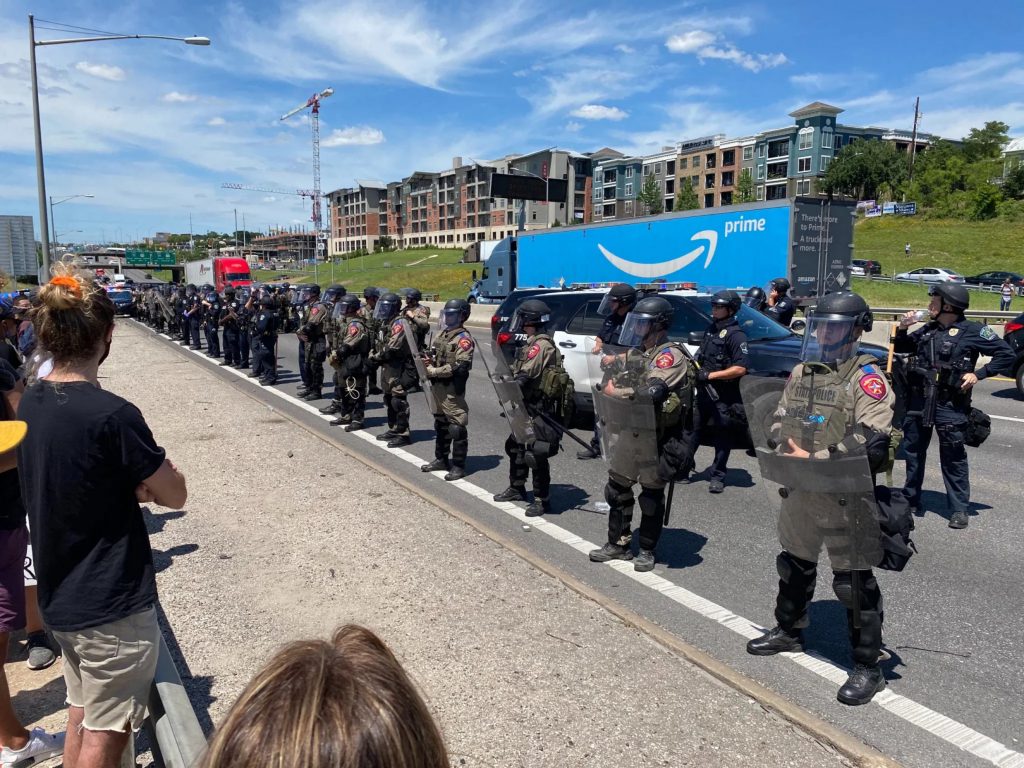
The day would also see cop cars smashed, walls across downtown vandalized, destruction at the Capitol, and lines of cops and state troopers retreating from oncoming crowds. APD HQ became a canvas, completely covered in messages.
While most of the attention remained focused downtown, police scanners and other news pointed to a broader picture of insurgency across the city. Stores across the city were looted–Targets, Walmart, Foot Locker, and reportedly some shops at the Domain. Police were spread thin and unable to control the crowds.
As night set, the insurrectionary energy downtown continued and morphed. A car was set on fire beneath I-35 as crowds gathered. As police lines and rounds of rubber bullets were deployed to protect the highway, crowds scattered and began looting down 6th street, hitting stores like Private Stock and Lone Star Liquor.
On Sunday, despite AJC’s last minute cancellation of their scheduled protest, large crowds continued to show up. They again took the highway, faced down the cops, and took over downtown. As night fell, the air of a party developed under the highway across from APD–people grilled food, drove in with their cars and blasted music, danced, and had a good time. As cops came in to try and disperse the crowd, rebels fought back with fireworks. While pinning the police lines down, others took the initiative and looted more stores, such as a Shell and World Liquor.
While the intensity of the protests largely subsided after the first weekend, there were still notable moments in the following weeks. A Juneteenth rally and speak-out by Black People’s Movement for Liberation. Some more takeovers of the highway, graffiti on APD, and flag burnings. 400+1 seized the initiative in trying to hold onto the streets. When a man named Logan Bucknam attempted to run through a crowd of protestors in late June, he was exposed fairly quickly.
In August, protestors began to descend on the home of Ken Casaday, president of the Austin Police Association. They even stole his lawn pig.
The daily downtown protests also led to the creation of larger networks of affinity between those on the streets and an expansion of groups and crews (some of which we highlight below). From the onset of the uprising, innumerable networks began to self organize for the defense of the rebellion. These networks coordinated safe rides, legal support, street medic presence, getting defensive equipment like goggles, helmets, and shields into the hands of frontline insurgents, food, water, & PPE, and more. Existing mutual aid networks, including those formed in the pandemic, came together with newly activated crews to form a temporary foundation to sustain the fight.
Groups formed
- UNI Abolition (@uni_abolition)
UNI Abolition formed during the uprisings this summer, when abolition was in the air, as a collective that centered Black queer abolitionist leadership. Though this abolitionist collective has had to put its weekly deliveries on hiatus due to capacity issues, they have partnered with Stop the Sweeps ATX this fall to replace crucial items like tarps, tents, and medications that were seized by city agents targeting houseless people’s campsites.
- Cooking 4 Causes
Cooking 4 Causes formed as an offshoot of Austin Direct Action. Working in the legacy of Garrett Foster and his partner Whitney, they have served meals at the camp across from APD since the summer, and many of the participants have been involved in protests against the police.
- Jail Support
While not much is public about the Jail Support crew, we know that there has been consistent efforts at a jail support presence at the Travis County Jail. These efforts, which started up around the beginning of the uprisings of the summer, have fluctuated over the months, both the network continues to go out and offer resources, support, and connection to those exiting the jail.
After The Crest, Into the Fall
“Defund the police,” as the demand-oriented wing of the uprising, gained momentum. As groups like CCU pushed the demand and mobilized people to testify at City Council hearings, the city eventually made some paltry concessions–which CCU called out as half-measures that did little to materially impact the police budget and operations. Nevertheless, the police and their bootlickers continued to propagate a narrative of Austin as a zone of lawlessness and total hollowing out of the police department (we wish).
In the fall, Stop the Sweeps intervened in negotiations around the contract and have been able to win concessions, which they are fighting to expand and make stick. Sweeps continue, and so does the resistance to them.
When Armenia and Azerbaijan entered into military confrontations this summer–over issues of land and power–protests occurred across the Armenian diaspora. While we don’t know much about the character of the local Armenia protests, we were pleasantly surprised to see that one protest took I-35 briefly. We don’t know much more than that, but it doesn’t appear that there was significant repression in response.
In the Montopolis neighborhood, a fight against a proposed rezoning & development of land on Kemp St. brought neighbors, community organizations like Protect Montopolis, CCU, & the Montopolis Community Development Corporation into conflict with the city, including “progressive” council members like Greg Casar. In October, they declared victory when the developer removed their bid for the land.
In the last months of the year, good news started to circulate that many cases from the summer had been dropped. The newly elected “progressive DA” has also promised to drop uprising related cases, but we will see how comprehensive or true to his word he will be. We celebrate the cases that have been dropped, and still encourage everyone to be vigilant in following the remaining cases and defending the rebels of the summer–especially those who are being written out of the narrative for their alleged participation in “bad protesting” (looting, attacks on property, fighting the cops).
Things are quiet in Austin right now. Some groups continue to organize–some at reduced capacity, some with a renewed consistency. Many groups and people have stepped back, feeling the burdens of the year and the threat of burnout looming over them. While things are quiet right now, we do not expect that to always remain the case. The collective experiences we all bore witness to, the skills and strategies we learned, the infrastructure built, and the connections made this year will resurface in other ways–whether in our daily lives or the next flashpoint of revolt. We do not need to rush this process, nor do we need to set expectations for how this process will look. Instead, we remain open and optimistic for the unpredictable, emergent formations that will shape the future. But we know for sure that after this year, nothing can be the same, and nothing will go back to as it was before.
Got a something you need to publish? Send it to us! We take all kinds of radical/revolutionary content, with a special affinity for anarchist/autonomous movements and crews. We specialize in research and strategic intelligence that can inform direct action, but we’ll take art, opinion pieces, and other stuff too! Submit content to austinautonomedia [@] autistici [dot] org.
